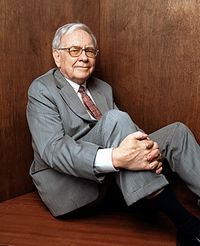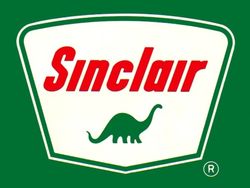
Newspapers grabbed this one eagerly but there's something neither they nor Buffett know.
They already do charge. All of them.
They charge you in time. The time it takes you to read anything is a real cost, to you. I can very much understand why you would resent anyone talking about charging you money for something you're already paying for, with your time, attention, and (assuming you believe what you read) credibility. I resent it, too.
Especially since, in the old print model, content was always free to begin with. The cost of the paper was never more than the cost of getting it from the printer to you. The cover price was split between the newscarrier (or newstand) and the truck that dropped piles of paper on the street (or driveway).
How were writers paid 20 years ago? Advertising. The ads that surrounded the content paid for the writers, the editors, the salesmen, the typesetting, and the printing. Not to mention the executives at the top of the tower and the profits that went to shareholders.

Say you were a car dealer. The guy who sold you ad space could tell you how many of his readers drove by your place of business every day, and what the impact of seeing your ad in his paper was likely to be. Here is how many cars you sold when you didn't advertise. Here is how many you sold when you did.
Knowing your audience, knowing the value of that audience, and extracting that value from businesses is the heart of publishing. It's a market-making exercise. To say reporters are what the newspaper business is about is like saying lions and tigers are what the circus is about. Cirque du Soleil would say you're missing the point, and they'd be right.
How does this work online? Understand, first, that you're making markets, not producing news. You want to prove to a potential advertiser that, if they place an ad on your page, they will sell more stuff. You want to show them just how much more stuff. So here's the formula:
-
Make certain the right people are seeing your pages. This may include making sure the wrong people aren't seeing your pages. The more specialized your news content, in other words, the less likely someone is to see it elsewhere, the more important it is to at least have a registration wall put out. And the power to withhold access to anyone you decide shouldn't get it.
-
Make certain you're hitting your target. Know the place, industry or lifestyle you are covering. Make sure you have all the news of importance to your segment of the market. Don't include extraneous material. Local newspapers don't need national news. Bike publications don't need stories about running (unless it's a triathlon).
-
It's not all about the Web. The best way to know you're hitting your target is to have regular e-mail contact with readers, and be able to prove those e-mails are opened and read. It's important to make this a two-way street, and to make your Web site a place where everyone in your chosen community feels safe in speaking their mind.
Warren Buffett is 81. I get it he doesn't understand the nature of the newspaper business. He's an investor. A very good one. One who has been smart enough to avoid the newspaper business.
So why is anyone in that business thinking he knows what he's talking about?












Fantastic perspective, the web is both synonymous with the current media world (revenue from advertising, business solutions, etc.) but also very different. It is difficult to think one way and not the other.
Fantastic perspective, the web is both synonymous with the current media world (revenue from advertising, business solutions, etc.) but also very different. It is difficult to think one way and not the other.
Hello Dana,
Recent reader, and glad for it.
If I remember correctly Mr. Buffet holds a very large stake in the Washington Post.
If so, he has not avoided the newspaper business.
If not, I stand corrected.
Either way, I am an enthusiastic new reader.
Thanks
Harvey Ginsberg
Hello Dana,
Recent reader, and glad for it.
If I remember correctly Mr. Buffet holds a very large stake in the Washington Post.
If so, he has not avoided the newspaper business.
If not, I stand corrected.
Either way, I am an enthusiastic new reader.
Thanks
Harvey Ginsberg
As a follow up to my prior post, here are relevant portions of a WSJ article from January 2011:
“Warren Buffett, who has a long association with the Washington Post Co., is leaving the board of the newspaper publisher to focus more on his own company, Berkshire Hathaway…Berkshire owned an 18.7% stake in Washington Post class B stock as of Feb. 1, according to the Washington Post’s latest proxy filing. “We’re going to keep every share of stock we have. I would never sell a share of the Post,” Buffett said in the interview.”
As a follow up to my prior post, here are relevant portions of a WSJ article from January 2011:
“Warren Buffett, who has a long association with the Washington Post Co., is leaving the board of the newspaper publisher to focus more on his own company, Berkshire Hathaway…Berkshire owned an 18.7% stake in Washington Post class B stock as of Feb. 1, according to the Washington Post’s latest proxy filing. “We’re going to keep every share of stock we have. I would never sell a share of the Post,” Buffett said in the interview.”
You’re right. As of the end of last year Berkshire Hathaway owned almost 23% of The Washington Post Co. http://www.cnbc.com/id/22130601/
But in their defense, the newspaper and publishing holdings of the company are not nearly as material these days as the Kaplan Learning Centers.
You’re right. As of the end of last year Berkshire Hathaway owned almost 23% of The Washington Post Co. http://www.cnbc.com/id/22130601/
But in their defense, the newspaper and publishing holdings of the company are not nearly as material these days as the Kaplan Learning Centers.
Enjoy reading your columns in Seeking Alpha. I note, above and to the right,some of the resources to which you refer folks. I’m prompted to put in for a reference that I enjoy reading every day, Biofuels Digest, by Jim Lane. He’s smart, and a good writer. He covers biofuels as well as the emerging bio-chem field, looking at what’s doing in the non-fossi- fueled world.
Anyway, thanks for your columns.
(Argle Bargle)
Enjoy reading your columns in Seeking Alpha. I note, above and to the right,some of the resources to which you refer folks. I’m prompted to put in for a reference that I enjoy reading every day, Biofuels Digest, by Jim Lane. He’s smart, and a good writer. He covers biofuels as well as the emerging bio-chem field, looking at what’s doing in the non-fossi- fueled world.
Anyway, thanks for your columns.
(Argle Bargle)
That’s great. They’re at http://www.biofuelsdigest.com/ and they have been added to our “Dana’s Posse” typelist, found at the side panel.
That’s great. They’re at http://www.biofuelsdigest.com/ and they have been added to our “Dana’s Posse” typelist, found at the side panel.
Dana,
Hope I’m not beating a dead horse here.
I was commenting on your statement:
“Warren Buffett is 81. I get it he doesn’t understand the nature of the newspaper business. He’s an investor. A very good one. One who has been smart enough to avoid the newspaper business.
So why is anyone in that business thinking he knows what he’s talking about?”
Your point was that he avoided the newspaper business and therefore did not know what he was talking about.
As I noted he didn’t avoid the business as an active board member and investor.
His long term board membership along with a large scale stake relative to the paper’s ownership is what gives him the expertise to evaluate the industry.
Perhaps your position is that he doesn’t know what he is talking about REGARDLESS of whether or not he was involved in the business.
If so, fair enough.
But I’m not sure I understand your reference to Kaplan Learning Centers.
The value of the Post stake vis a vis Kaplan is beside the point when it comes to Buffet’s knowledge of the industry. If Buffet was a passive investor rather than an active board member I would agree with you.
Thanks for your courtesy in responding to my prior comments.
Harvey
Dana,
Hope I’m not beating a dead horse here.
I was commenting on your statement:
“Warren Buffett is 81. I get it he doesn’t understand the nature of the newspaper business. He’s an investor. A very good one. One who has been smart enough to avoid the newspaper business.
So why is anyone in that business thinking he knows what he’s talking about?”
Your point was that he avoided the newspaper business and therefore did not know what he was talking about.
As I noted he didn’t avoid the business as an active board member and investor.
His long term board membership along with a large scale stake relative to the paper’s ownership is what gives him the expertise to evaluate the industry.
Perhaps your position is that he doesn’t know what he is talking about REGARDLESS of whether or not he was involved in the business.
If so, fair enough.
But I’m not sure I understand your reference to Kaplan Learning Centers.
The value of the Post stake vis a vis Kaplan is beside the point when it comes to Buffet’s knowledge of the industry. If Buffet was a passive investor rather than an active board member I would agree with you.
Thanks for your courtesy in responding to my prior comments.
Harvey